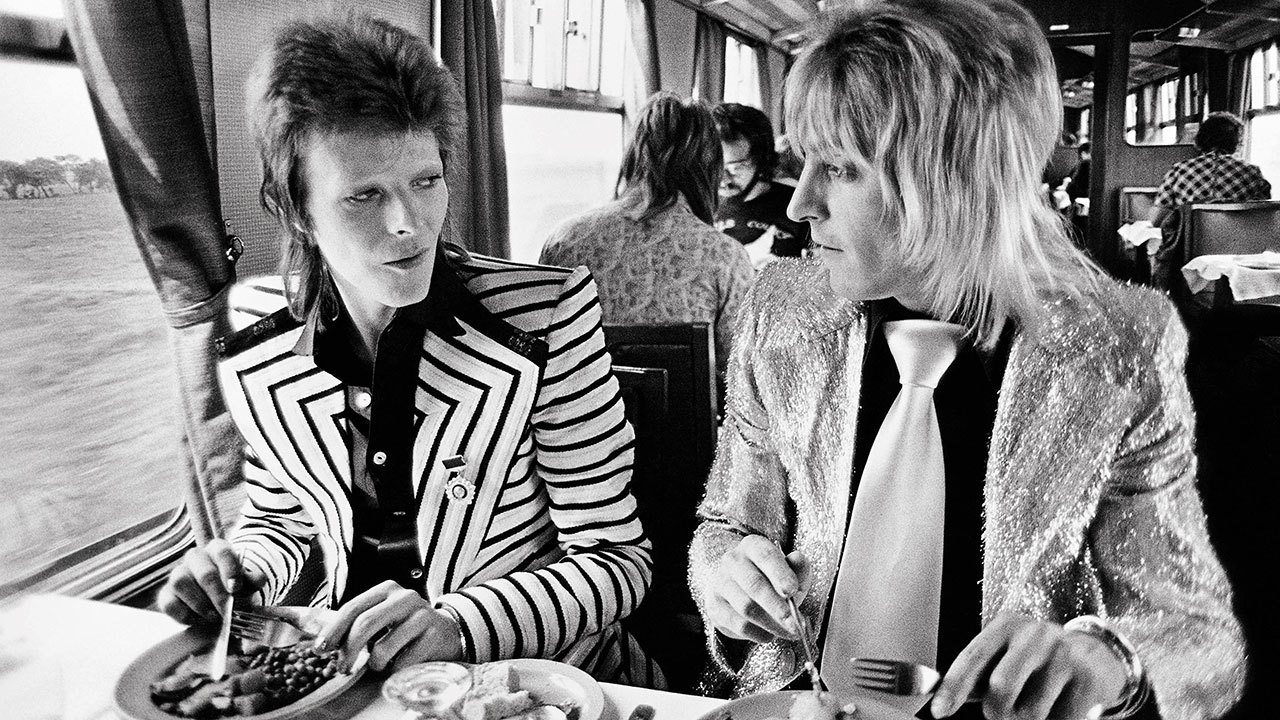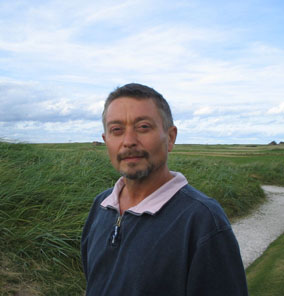After the rise comes the fall. On October 20,1973, Mick Ronson played with David Bowie on stage for the last time in that decade. Only 200 people saw the appearance in the flesh, shot for NBC’s The Midnight Special.
Dubbed The 1980 Floor Show, it was a strange day. Bowie serenaded supposed transsexual Amanda Lear on Sorrow, and he and Marianne Faithfull duetted on Sonny & Cher’s I Got You Babe. Marianne was wearing a nun’s habit with the back cut out and no knickers, so everyone in the band could see the most sought-after arse of swinging London, although the audience couldn’t.
Bowie hated the end results: “shot abysmally”. This was the night Ziggy Stardust truly left the building, which may explain why a smiling Bowie ended each song with an affectionate pat on Ronson’s white satin-clad back. The two men wouldn’t appear on the same stage together again until 1983, when they reunited for a song at a show in Canada on Bowie’s Serious Moonlight tour.
In between there had been a spat. In 1976, at the height of his cocaine addiction, Bowie washed his hands of the good old days. “I gave them [his band the Spiders From Mars] more life than I intended,” he said. “And I was also getting honestly bored. There’s only so much you can do with that kind of band. I wanted no more to do with that loud thing. Hurt my ears. Wasn’t pleasing my mind too much either. Since then, poor Mick has completely missed his vocation. From his faulty solo career right on down. I’ve been disappointed. He could have been amazing. I just don’t know. Christ, I haven’t spoken properly with him in years. I wonder if he’s changed.”
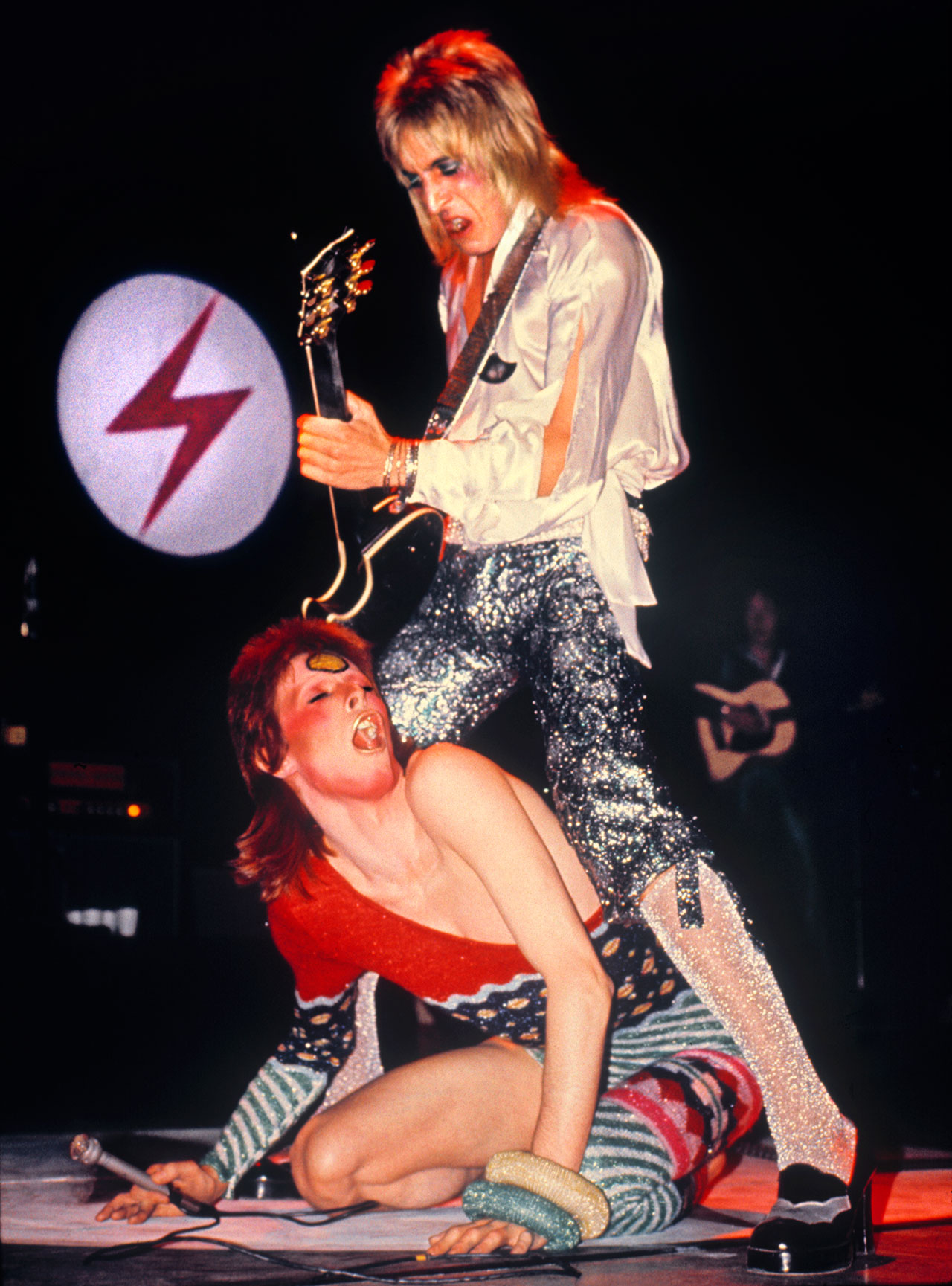
Evidently Bowie’s cage was rattled by Ronson’s comment: “David needs someone around him to say: ‘Fuck off, you’re stupid.’ He needs one person who won’t bow to him.” Bowie’s reply was: “I’ve got God. Who’s Mick got?”
“There was certainly a time when David relied on Mick,” says singer Dana Gillespie, a fellow MainMan artist and mutual friend, “but he’d drop all communication with you. Mick was badly hurt when David never returned his phone calls.”
In fairness, Bowie became more charitable later. “Mick was the perfect foil for the Ziggy character,” he said. “He was very much a salt-of-the-earth type, the blunt northerner with a defiantly masculine personality, so what you got was the old-fashioned yin and yang thing. As a rock duo I thought we were as good as Mick and Keith.”
In 1970, Mick Ronson changed the musical fortunes of David Bowie, a struggling singer-songwriter with two novelty hits behind him. Together, and with their band the Spiders From Mars, they reinvented Bowie musically and created some of rock’s best-loved albums: Hunky Dory, The Rise And Fall Of Ziggy Stardust And The Spiders From Mars, Aladdin Sane. Afterwards, Ronson struggled to match that initial success, despite a catalogue of collaborations that included some of rock’s biggest names: Bob Dylan, Lou Reed, Ian Hunter, Roger McGuinn, Morrissey, John Mellencamp and more.
An important new documentary, directed by Jon Brewer, puts Mick Ronson back in the spotlight. Bowie explains how a quietly spoken municipal gardener from Hull helped build the Bowie legend and become the undisputed king of glam-rock guitarists. It’s a very British story – about what happens when north and south collide – and it’s also a story about sex, drugs, Mormons, mime artists, guitar fellatio, the cutthroat nature of the music business and cancer.
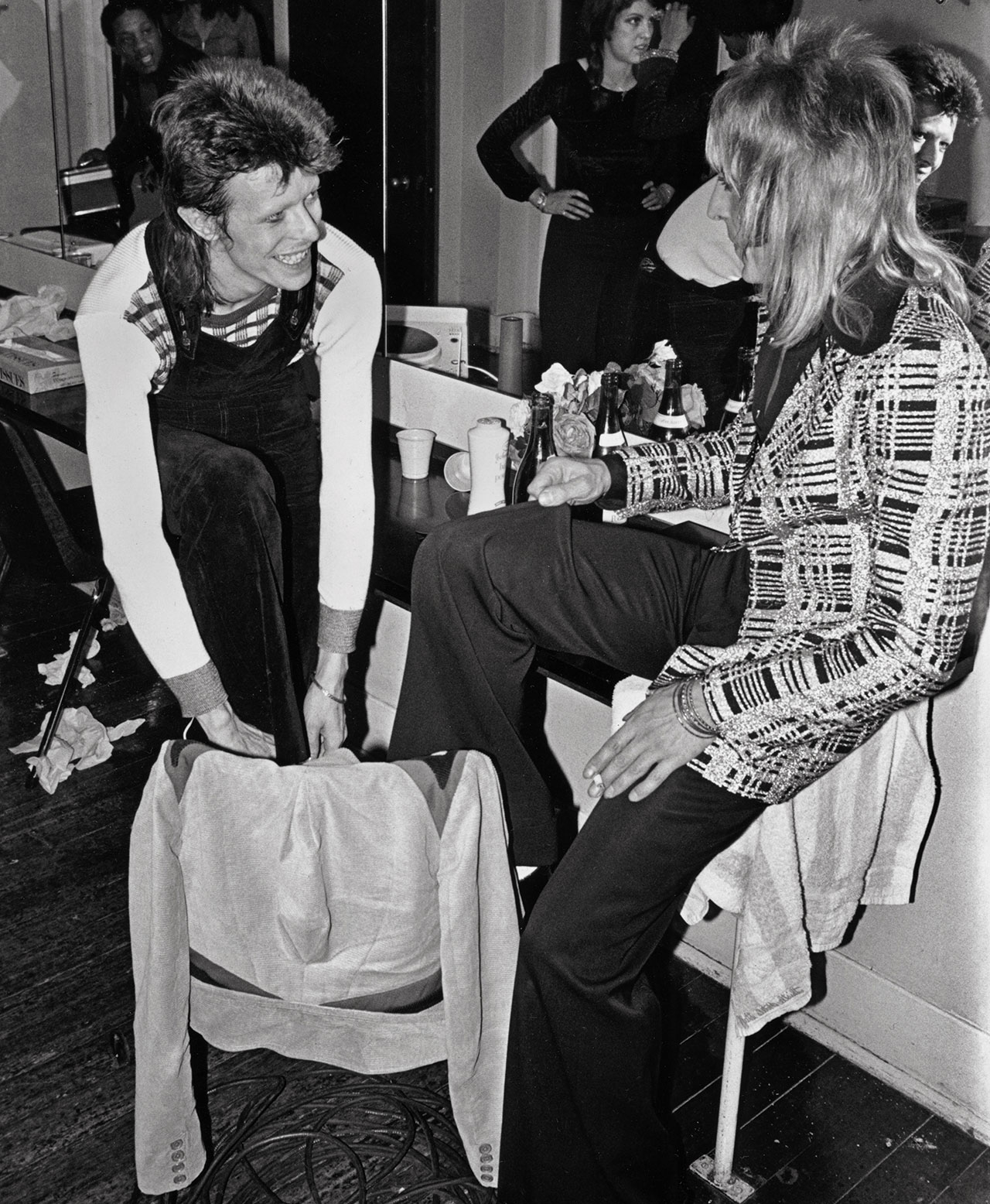
Although Ronson’s career was defined by his time with Bowie, there was a significant before and after. In the 1960s he played in various Hull groups, including The Mariners, who were advised by Rolling Stone Bill Wyman to change their name to the King Bees at around the time Bowie was also fronting a group called Davie Jones And The King Bees; and The Rats, whose main claim to fame was a 1967 single called The Rise And Fall Of Bernie Gripplestone.
Benny Marshall was The Rats’ lead singer and a close friend of Ronson. “Mick was the best guitarist in Hull, so when he left to head down south and join Bowie, I was pretty upset,” he says. “John Cambridge, our drummer, had played with Bowie on [the album] Space Oddity. He was the bloke who went back to Hull in January 1970 with the brief to find Ronson and bring him to London. He found Mick marking out the lines on the municipal football pitch.”
Cambridge did as instructed and the pair were introduced at the Marquee club, where Bowie was playing on February 3, 1970. Two days later Ronson had learned the riffs and song structures well enough to back Bowie, Cambridge and Tony Visconti for a John Peel Radio 1 show live in concert at the Paris Theatre in Lower Regent Street in London. They did 15 songs, including a new number, Width Of A Circle, and plenty of material from Bowie’s recently released self-titled second album. Reaction was positive. This was better than Bowie’s regular gig at the Three Tuns pub in Beckenham. Ronson moved into Bowie’s Haddon Hall apartment on Southend Road in Beckenham and became part of the family.
Having tired of the hippie collectivism, Bowie wanted to make a hard rock album. As Visconti said later: “We respected groups like Cream, but we didn’t have that in us. We needed someone to be [that] important element, and that somebody was Mick Ronson.”
Everyone loved Ronson’s laconic Northern humour too, especially Bowie, whose father and mother came from Yorkshire and Lancashire respectively. He’d send Ronson up and get just as good back.
Visconti noticed his pupil’s keen interest. “He floored us. When David and I met him, we knew he’d fit in looks-wise, but we had no idea what was coming until he picked up his Les Paul and played for us. He really didn’t have to be taught the few songs we’d already worked up with John Cambridge. Mick watched our hands on the guitar and bass necks and he just knew what to play, but he didn’t say much. We thought he was just a cool, silent type. Later we found out that our apartment in Beckenham was very ‘big time’ for him and he was simply overwhelmed.”
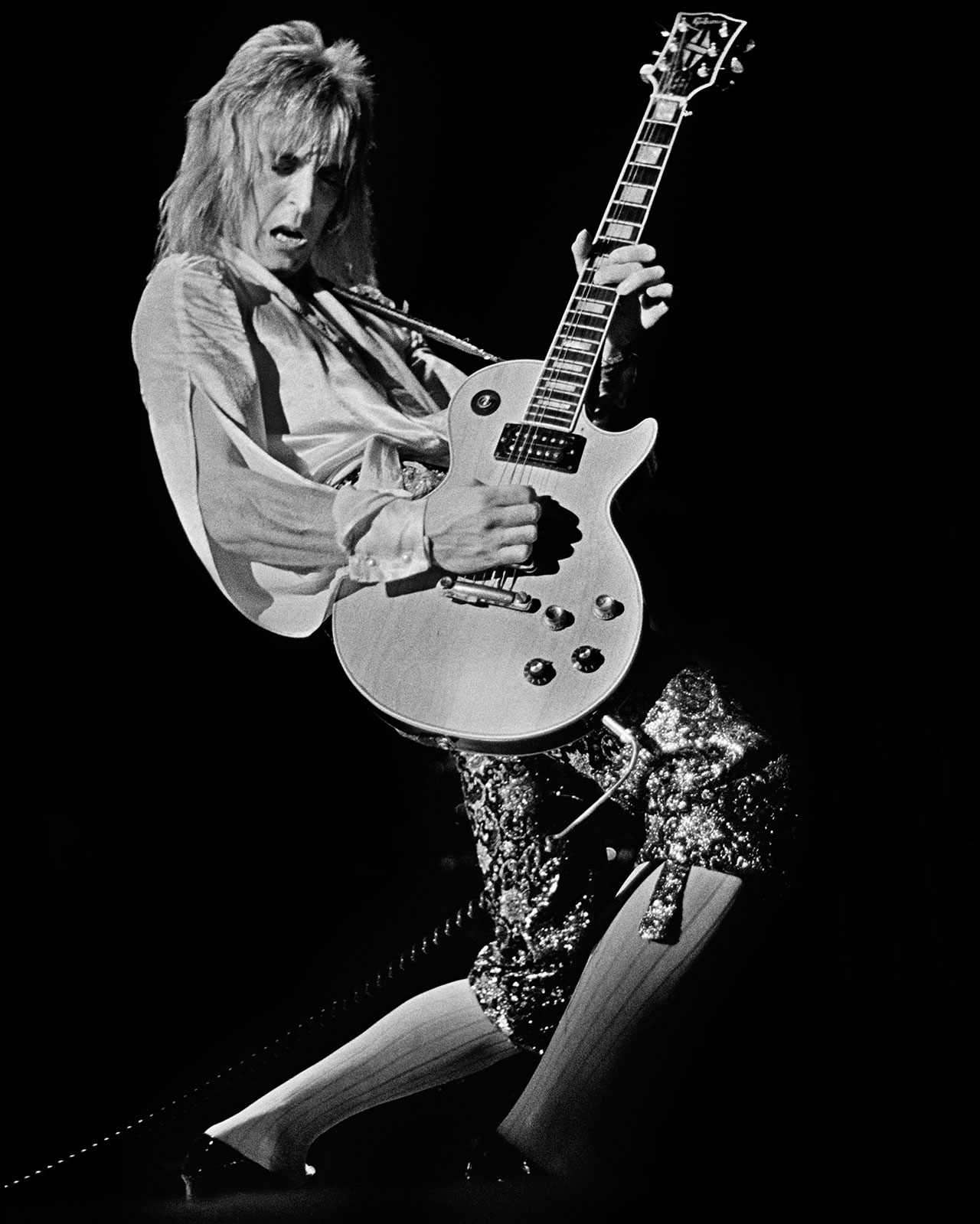
Before this auspicious occasion, bass player Rick Kemp had also scouted Ronno to play on fellow Yorkshireman Michael Chapman’s second album, Fully Qualified Survivor. “Michael said his producer Gus Dudgeon didn’t want him to play electric guitar,” says Kemp, “and asked me did I know anybody? I mentioned Ronson, which wasn’t a good career move for me, letting this little runt in. Gus told me to find him. I was driving a Morris 1000 with the wings flapping off and I spotted him working, mowing lawns. I put the question: ‘Do you want to play on an album?’ He replied: ‘What do you mean? One that’s in the shops for sale, like? And I get paid?’ I took him down to London, and within minutes of arriving he’d got the runs for glory.”
Tony Visconti insists that Ronson came to Trident Studio in September 1969, when the David Bowie album was being finalised: “Mick came to the mix of Wild-Eyed Boy From Freecloud, and was persuaded to play a little guitar line in the middle part and joined in the handclaps on the same section.”
If he did, he isn’t credited. Ronno’s first recorded work with Bowie was on the remade and rocked-out single Memory Of A Free Festival Part 1/Part 2, recorded in September 1969 and released in June 1970. It bombed.
In April, sessions began for The Man Who Sold The World. It was a brilliant album, but another commercial flop. It was so badly received that Bowie was convinced to ditch the band, and Ronson, Visconti, ex-Rat Woody Woodmansey and Marshall took the collective name Ronno and released a single, 4th Hour Of My Sleep/Powers Of Darkness, a freestyle rock-metal affair that showcases Ronno’s blistering Les Paul playing. It sank without trace, although Vertigo Records later included both sides on their Superheavy Vol 1 and 2 compilations.
Later on, Ronson’s crunching heavy metal attack, allied to arcane Wagnerian, dystopian, mind-fuck lyrics, was hailed as a masterpiece. Certainly Ronson’s contributions to Bowie tracks such as She Shook Me Cold, Running Gun Blues and the epic Width Of A Circle cemented his place, leading Bowie to call him, with a smug smile, “my Jeff Beck”.
Bowie and Ronson were both huge fans of Beck’s Truth album. Marshall says: “He knew all the licks, except Beck’s Boogie, which he dissected but couldn’t master. It infuriated him. In 1968, The Rats had supported Beck at the Cat Ballou in Grantham, and afterwards Ronno asked him to show him the fast run at the beginning. So Beck plays it, and Mick says, ‘No, play it slower.’ Beck said: ‘If I play it any slower I’ll stop!’ But he was patient, and Mick learnt that riff.”
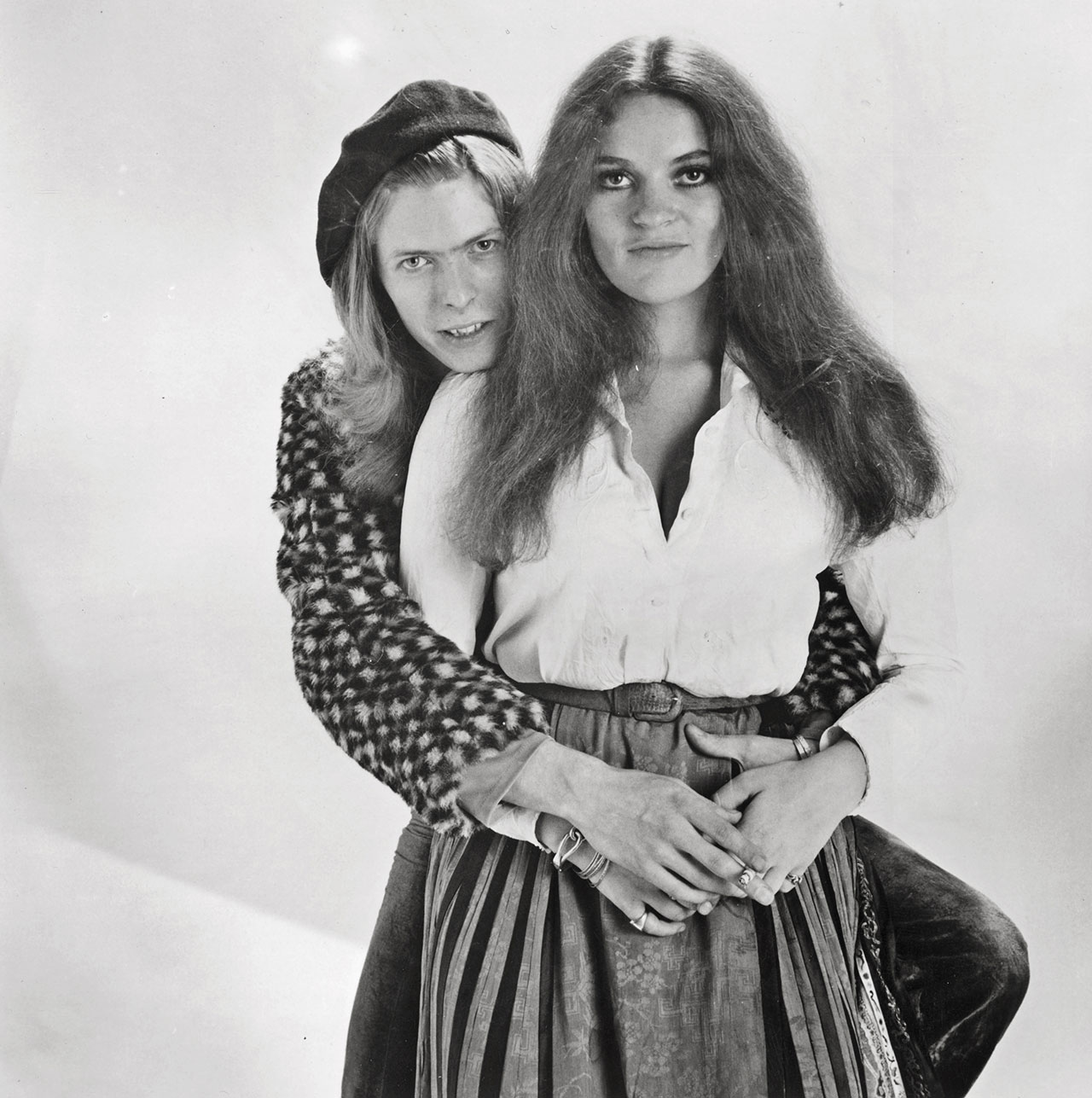
The machine was beginning to roll, although Ronson wasn’t always aware of the significance. “We played the Roundhouse [the Atomic Sunrise Festival] in 1970 and there were all these hip types hanging round,” Ronson recalled. “I got given a puff on a joint and got so stoned I don’t remember what happened on stage; I was in another world. They said Marc Bolan was there, but I can’t remember that at all. He was around a lot and the bands were starting to rub off on each other.
“Just after Hunky Dory and before Ziggy there was a lull in the scene – it needed jarring and excitement. Bowie’s dressing us up and the make‑up was needed. It wasn’t what I usually did but it was exciting. On stage I became someone else. I’d been very shy and nervous as a kid, but in costume I became another person, detached.”
Bowie’s 1970 album The Man Who Sold The World had not been a commercial breakthrough, but it added to Ronson’s confidence. Visconti and Ronson had masterminded the sound, dashing off arrangements in the Minstrel Gallery or the basement at Hedonism Hall while Bowie canoodled with Angie elsewhere, chucking out lyrical fragments in between romps. She Shook Me Cold, the dirtiest song he ever wrote, was directly about Mrs Bowie, but it was Ronson who provided the Jimi Hendrix-style intro and the power trio setting à la Cream. Later, Angie lamented the fact that Ronson didn’t receive the publishing he deserved: “In terms of kudos and feeling that one is valued, it would have been nice for Mick Ronson to have had publishing credits.”
Meanwhile, The Hype, with Cambridge and then Mick ‘Woody’ Woodmansey on drums, took this occult blitzkrieg to those rock strongholds Harrogate and Scarborough. Ronson and Bowie even performed the songs as a duo at the Marquee club and the Haverstock Hill Country Club, just before bass player Trevor Bolder’s arrival.
Visconti’s departure gave Ronson his ‘in’. “He’d done all the string and piano arrangements, so it was my chance to fill the gap,” said Ronson. “I’d never done it before, but I could read and write music and I’d watched Tony at Haddon Hall, writing in the basement, saw how he did the charts, and I’d help out.”
Ronson had already written a mini-score for four recorders, used in the break in All The Madmen. It was a start. “I thought: ‘Well, if you can do that then so can I.’ I went out for dinner with Dana Gillespie, who had tracks that needed strings, and David said: ‘Oh, Mick’ll do that!’ I never had, but it was great. It was all done in your head and then straight to piano and guitar. David pushed me forward. That was his thing. He made stuff happen.”
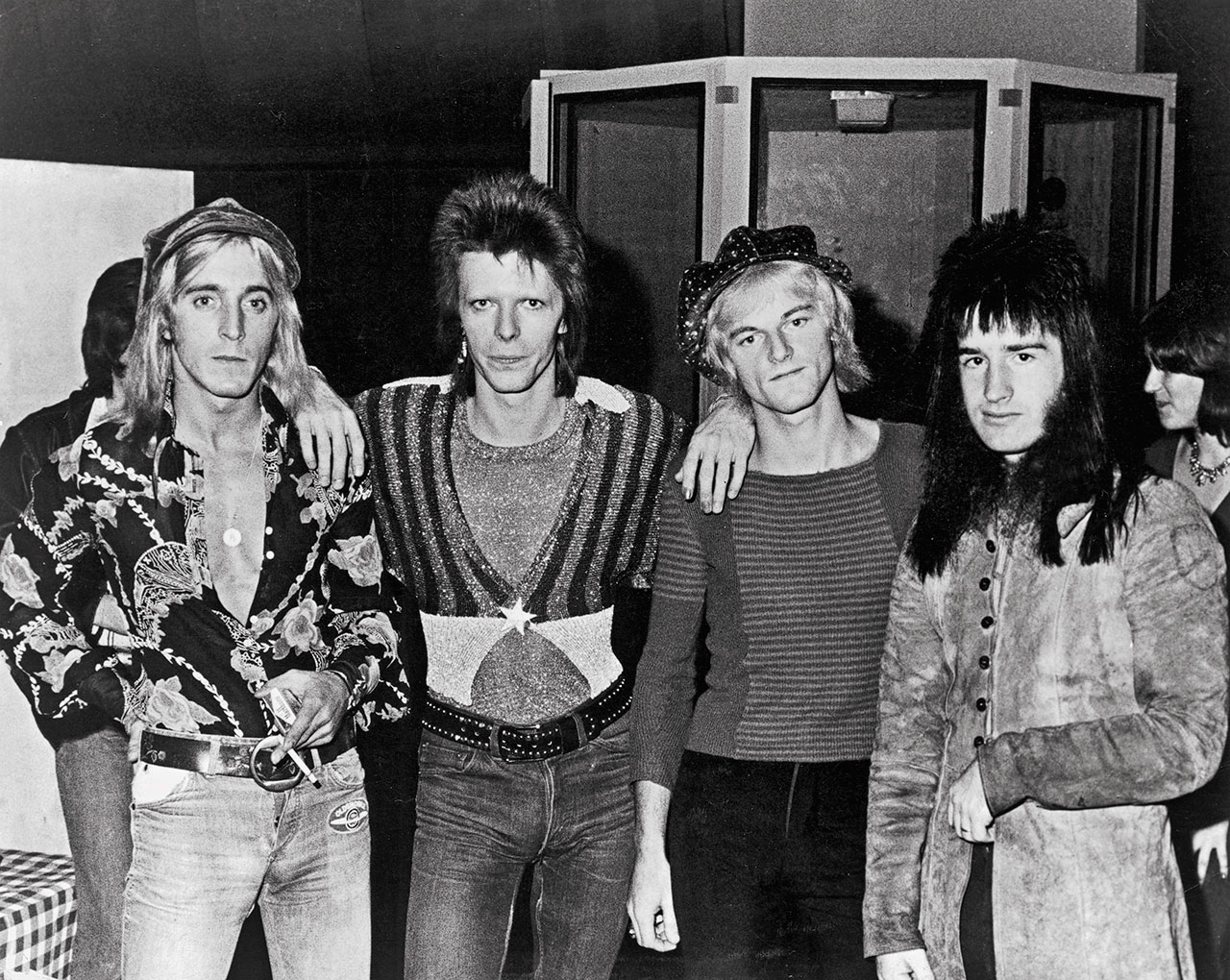
The single Holy Holy, designed to kick-start belated interest in The Man Who Sold The World, didn’t trouble the charts either. Produced by Blue Mink bassist Herbie Flowers (who would later add the memorable bassline to Ronson and Bowie’s production of Lou Reed’s Walk On The Wild Side), Holy Holy had a whiff of The Move about it. The B-side, Black Country Rock, a stunning parody of Marc Bolan’s Tyrannosaurus Rex, would have seemed the better choice. Bowie and the boys performed Holy Holy for Granada TV, one of the first occasions when he slipped into one of Mr Fish’s dresses-for-men, but not the last.
Bowie was now heavily reliant on Ronson. On Hunky Dory the guitarist finally got his credit, as the arranger of Changes, Life On Mars?, Kooks, Quicksand and Biff Rose’s Fill Your Heart, virtually copied note for note. In retrospect many have noticed how similar the sound of Hunky Dory is to Michael Chapman’s Fully Qualified Survivor, including Chapman himself.
Ronson wasn’t fazed by his burgeoning role, giving the Royal College Of Music-trained Rick Wakeman instruction for the now iconic piano parts on Life On Mars?. Wakeman didn’t mind: “He was a tremendous human being with oodles of talent,” he said.
Bowie producer/engineer Ken Scott also points out “the great orchestral versions that Ronno put together. Even more brilliant when you consider he had this habit of running out of time. I remember him rushing in ten minutes before the session, running up to the bathroom and locking himself in so he could find the privacy to finish writing. He’d come out with a huge grin and a stack of charts.”
On the Ziggy Stardust epic Five Years, his string section whipped up the hysteria. On Suffragette City, it was Ronno who came up with the funky, lurching ARP synthesiser sound that many mistake for saxophones. All those years studying piano and violin and listening to string quartets in Hull paid off.
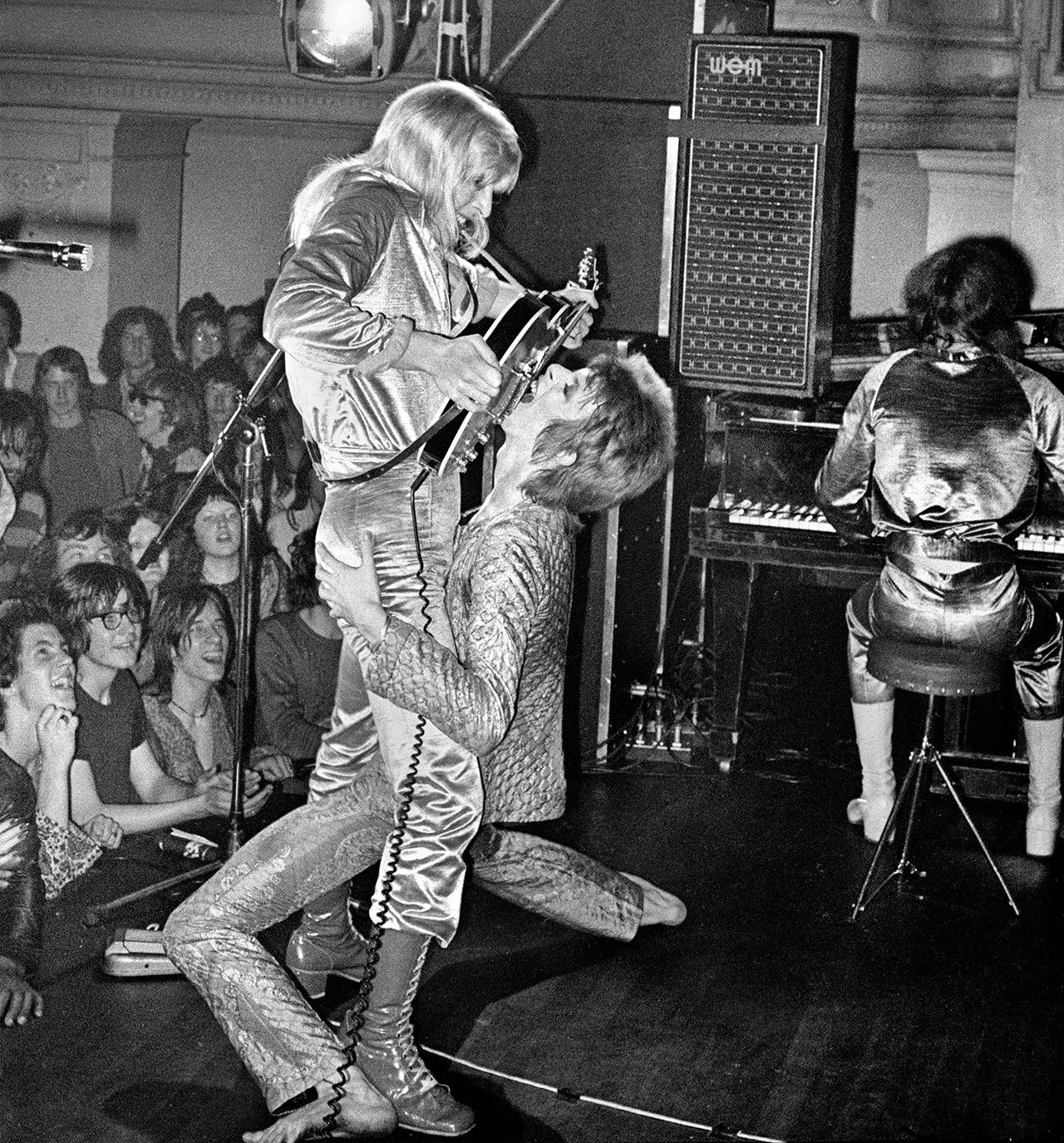
His work on Lou Reed’s Transformer effectively rescued Reed’s career after his debut solo album had bombed. “It was a good experience for me,” said Ronno. “Lou’s guitar was always out of tune, so I’d kneel in front of him and tune it properly. He didn’t care, cos he was so laid-back.”
And without his contribution, Transformer might never have got off the ground. “It came out pretty well,” Ronson said. “Though I didn’t know what the hell [Lou] was talking about half the time. He’d say stuff like: ‘Can you make it sound a bit more grey?’”
Fortunately the album was a roaring success. “Transformer is easily my best-produced album,” Reed said. “That has a lot to do with Mick Ronson. His influence was stronger than David’s, but together, as a team, they’re terrific.”
It was a different world from the blues clubs of Hull. The band reluctantly allowed Angie to squeeze them into camp silver suits and apply the make-up – until, that is, they discovered that the girls loved it.
In January 1972, Bowie told Melody Maker he was gay; more accurately, bisexual. Ronson admitted he found it hard to deal with at first: “It embarrassed me. I wondered what people would say about me. I knew my family in Hull would get flak. I gave dad a car when I left for London and people threw red paint over it. Personally it was a bit of a shock, but Bowie manipulated the media again and again.”
Ronson approached the Ziggy Stardust project with slight suspicion. The explicit Suffragette City and the discarded Sweet Head weren’t usual fare for a 25-year-old who had been a practising Mormon until recently. “He worried about the lyrics,” Angie says. “I told him: ‘Look, all these people are waving their arms in freedom thanks to you. It may not be what you’re used to in Hull, but accept it.’ Then he’d simmer down and be happy.”
If the Ziggy album was a Ronson tour de force, the follow-up, Aladdin Sane, was a mixed blessing for him. His contributions were immense, but so were those of recently arrived pianist Mike Garson, whom Ronson had auditioned, later advising him to “make yourself indispensable. That’s what David likes. Don’t just be a session man.”
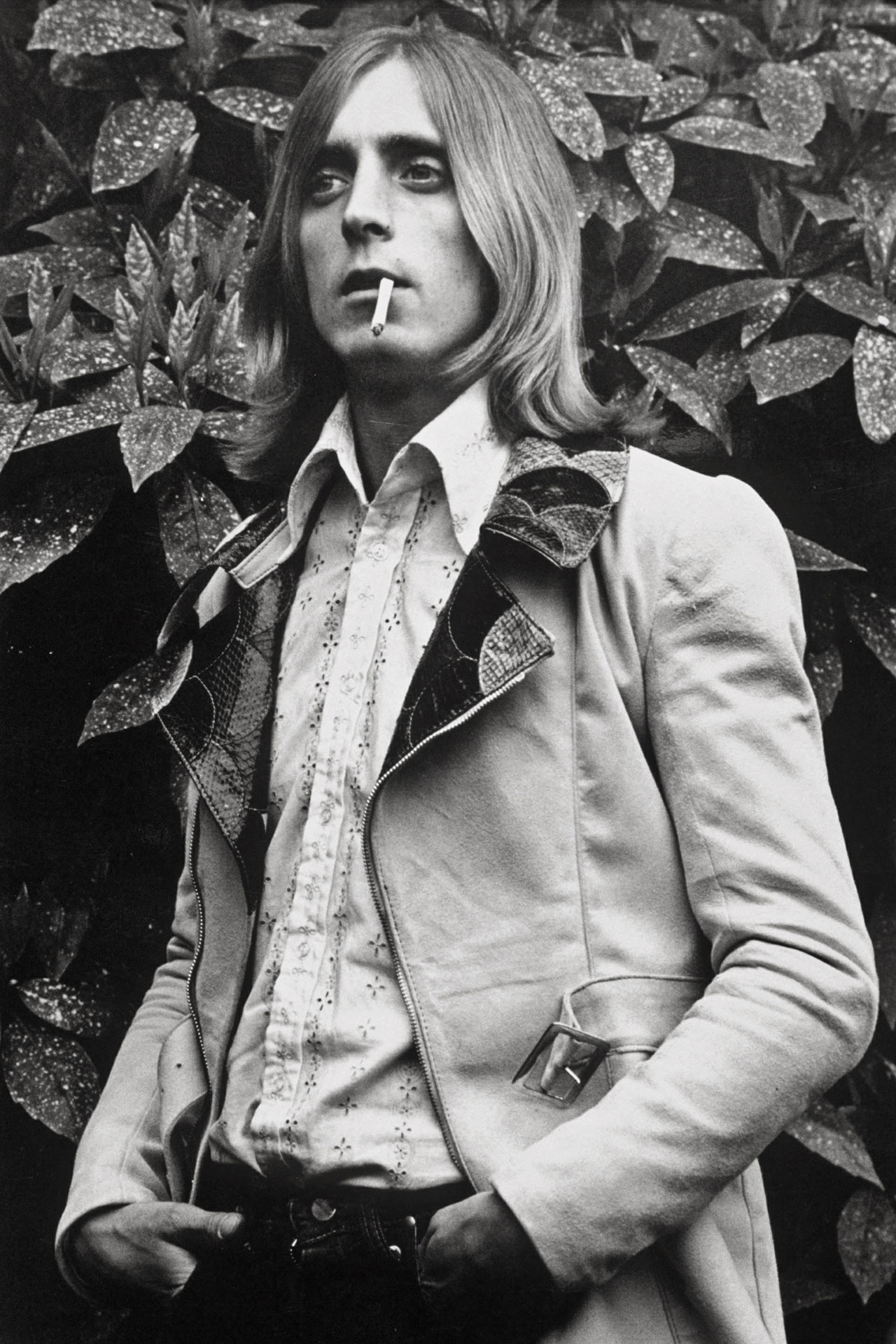
By 1973, though, it seemed that Ronson had become dispensable. The rhythm section of Woody Woodmansey and Trevor Bolder had been dropped (for having the gall to protest when they discovered that new arrival Garson was on 10 times their salary), and his relations with Bowie were frosty.
Sensing his anticlimactic mood after the 1980 Floor Show, effectively the closure of 46 months of classic work, Bowie’s wife Angie and Dana Gillespie took Ronson out for dinner to cheer him up. A formidable couple, they teased him mercilessly just to watch him blush. “I told him: ‘The only thing wrong with you Ronno is you’re a sweet-talking Romeo,’” Angie recalls. “‘Look at the trail of broken hearts you’ve left across the world.’” He’d look at me with those big, long eyelashes and say: ‘Ooh, Angie, you’re so silly…’ He was so handsome and so divine. Mick was a car door opener, a hand-holder as you crossed the street, the first one to get the young lady a drink. He was adorable. You noticed he had big hands and he looked more like a surfer than a typical bulky English rugby type. I was fighting women off with brooms.”
As the wingman was increasingly sidelined, mutual management company MainMan promised him the earth. He was to be the next superstar off the production line, said manager Tony Defries, the man who sold the man who sold the world. Maybe it wasn’t such a bad deal. In the summer of ’73, having finished his sessions for Bowie’s covers album Pin Ups, most of which he’d arranged as usual, Ronson returned to the Château d’Hérouville studios outside Paris and made his solo debut album, Slaughter On 10th Avenue.
Bowie chipped in from a distance, gifting the songs Growing Up And I’m Fine, Pleasure Man/Hey Ma, Get Papa and a rough translation of Lucio Battisti’s ‘Io vorrei, non vorrei, ma se vuoi’, now christened Music Is Lethal. RCA weren’t overjoyed with what they heard, and the album’s release date was put back more than six months to 1974.
Still, MainMan’s promise that the machine would kick in materialised in the shape of giant billboards in Times Square and glossy teenage mag spreads pushing Mick as a sex symbol: an image he was seldom at ease with, although anyone who saw the Ziggy-era shows knew he was as much an object of lust as Bowie himself.
Photographer Mick Rock, who chronicled the Bowie era, remembers: “Those two were a gift from the gods. Mick played the boy to David’s girl. No one else matched them, not even Mick and Keith.”
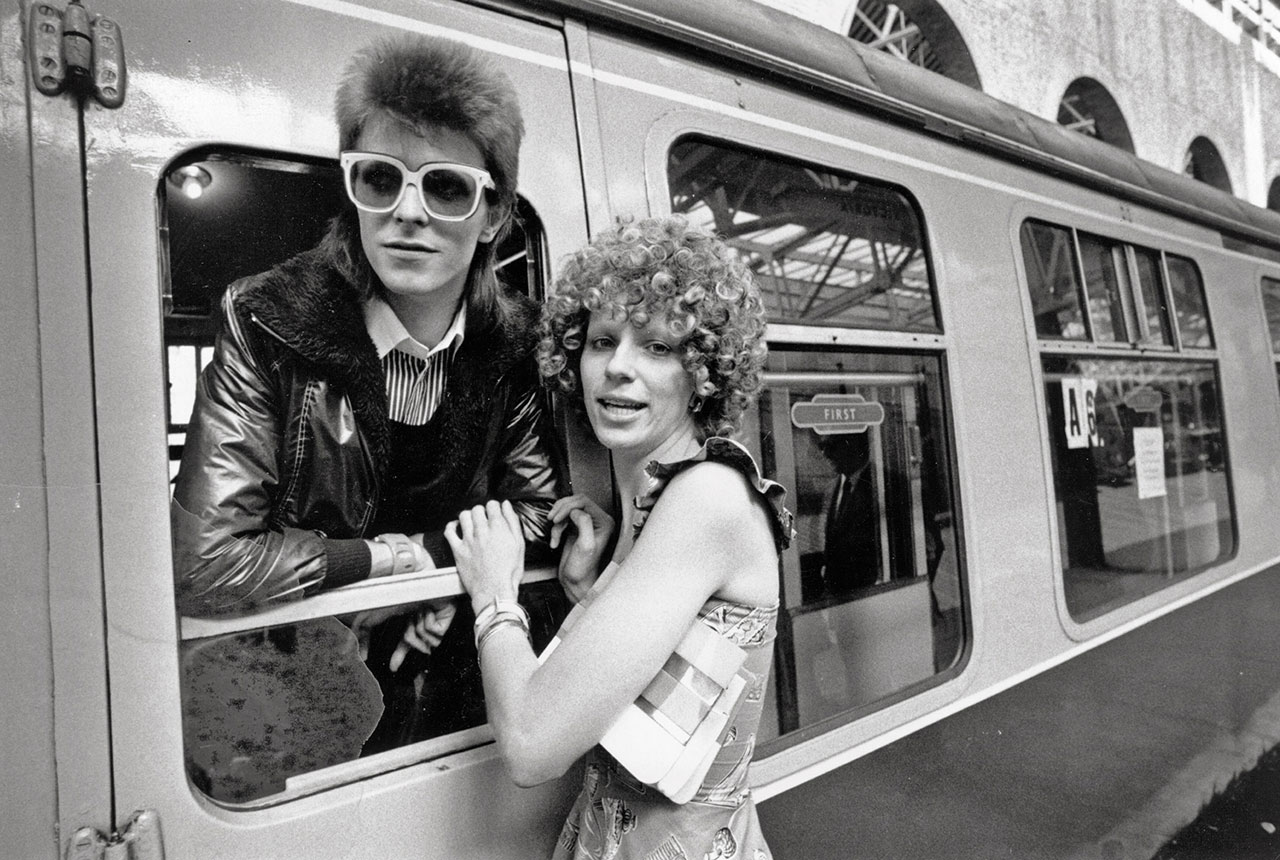
Within months Ronson was back in another band, joining Mott The Hoople for what would be their final single, Saturday Gigs. Ronson and frontman Ian Hunter had bonded back when Mick had knocked up a string arrangement for Mott’s Sea Diver, but the other Mott guys resented the arrival of this ‘rock star’ in their midst, with MainMan and RCA sending limos for their boy while Mott travelled together in a bus. Tired of the conflict, Hunter split the band.
Ronson went back to his solo career. Bowie didn’t take part in follow-up album Play Don’t Worry either, but allowed Ronson to use the backing track from the cover of the Velvet Underground’s White Light White Heat considered for the American attempt at a Pin Ups album but soon discarded.
Play Don’t Worry was excellent in parts. Not a natural songwriter, Ronson did himself proud on the opening Billy Porter, his take on Claudio Baglioni’s ‘Io me ne Andrei’, translated into Empty Bed, and versions of two songs by Pure Prairie League, whose 1972 album Bustin’ Out featured his guitar and strings.
While Slaughter was being mixed, Ronson returned to the studio with Bowie to create demos for future Diamond Dogs tracks 1984 and Dodo. His work wouldn’t appear on the finished album, a creepy, avant-garde affair, but his trademark guitar style did in the shape of Rebel Rebel, almost a Spiders From Mars pastiche riff, played now by Bowie, Ronno’s platinum-coated spectre fading into the background.
According to Ronson’s wife Suzi, “When Mick heard Diamond Dogs he wasn’t exactly depressed. He just thought: ‘Oh, that’s Dave going out on a limb.’ But he would have done that record like a shot.”
Instead Ronson embarked on a mercifully brief solo tour including show at London’s Rainbow Theatre in February 1974, where he had strings and woodwind sections and on backing vocals, the Thunderthighs (Karen Friedman, Dari Lalou and Casey Synge), who famously appeared on Lou Reed’s Walk On The Wild Side and Mott The Hoople’s Roll Away The Stone. Cast into the spotlight, Ronson didn’t appear overly confident. The ultimate sideman was too modest to carry this off. Bowie watched on from the wings and offered words of encouragement during the intermission, but decided against making a guest appearance.
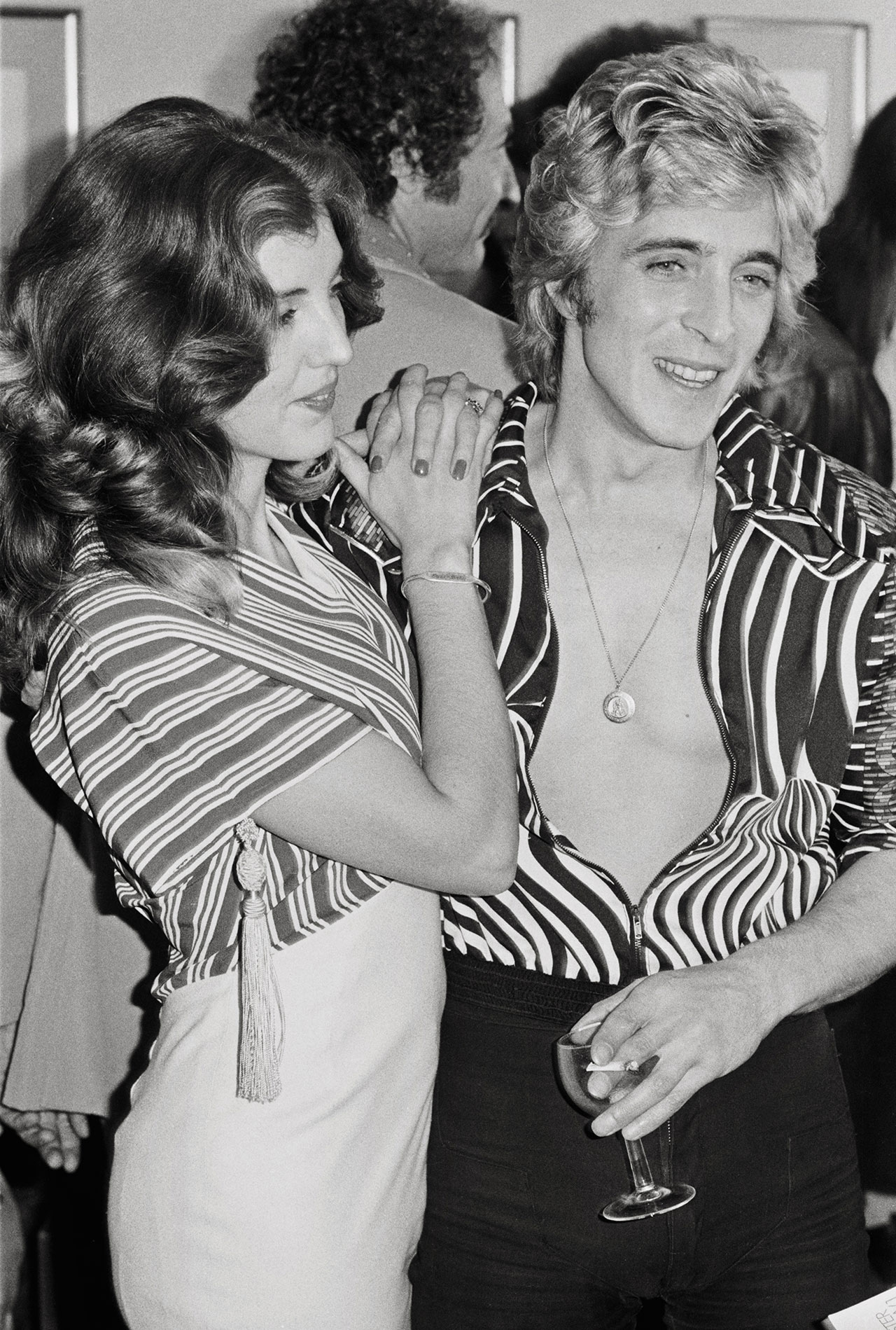
After Bowie and Lou, where do you go? Ronson produced and played on Ian Hunter’s magnificent debut solo album, with that signature opening flash of epic genius, Once Bitten Twice Shy, and Hunter inspiring one of Ronson’s most fearsome solos by showing him a bad review for Play Don’t Worry before he went in to lay down a guitar part on The Truth, The Whole Truth, Nuthin’ But The Truth.
In 1975 Ronson moved to New York, rented a place on Hudson Street near the Meatpacking District and enjoyed the city with his best friend Hunter, who had provided safe haven via Mott The Hoople, Mott and the Hunter Ronson Band.
This is where they met Bob Dylan, who invited Ronson to join his band of gypsies, the Rolling Thunder Revue, after a meet engineered by Dylan’s main fixer, Bob Neuwirth. That evening began at the Bitter End on Bleecker Street.
“We weren’t Dylan fans at all,” says Suzi. “Mick thought he sounded like Yogi Bear. But Ian took us anyway. And Dylan played the Desire album and he was mesmerising, better than David. Then we went to the Bottom Line, where Mick got thrown out three times for being drunk and disorderly.”
Back at the Bitter End, Hunter recalls “the whole place going insane cos Dylan was singing with Neuwirth and Rambling Jack Elliott. And Neuwirth clocks Mick and says to Dylan: ‘Go and ask him.”’
In Ronson’s version, “[Neuwirth] was with this guy,” he later recalled. “And I looked at this bloke he was with and thought: ‘Wait a minute, I know you.’ And, of course, it was Dylan. And we talked, and he said: ‘We’re going on the road. Why don’t you come with us?’ I honestly thought it was a hoax. Then Dylan phoned me, said the tour was going to happen and would I be there? Like a shot!”
“That tour rescued Mick’s professional life,” says Suzi.
Ronno was soon back with Hunter, appearing on You’re Never Alone With A Schizophrenic and Welcome To The Club. With his solo career on hold, he became a full-time producer. He worked with Van Morrison, John Mellencamp and Roger McGuinn, and there was production work with artists as varied as David Cassidy, Slaughter And The Dogs and the Rich Kids.
“He lapsed into the language of strings,” Hunter says, “but he was a bit lazy, cos if it was interesting he’d do it using fifteen tracks and one guitar track. He wrote arrangements on Marlboro Light fag packets. But he could be pernickety and picky if he was involved. He could have matured into a world-famous musician again, but he’d meet people on the street and next thing he’s doing a Mexican punk band.
“But he was great with fans. He’d invite them back for tea, he’d return their phone calls. Sometimes he could be the big guy and show off, so he wasn’t perfect, gorgeous as he was. I considered him like family, so there were arguments. One time he disappeared to Sweden for a project when we were in the middle of something, so I had a go. And he just said: ‘Look, I’ve done Bowie and I’ve done you so I’m allowed to fuck up,’ and we just collapsed into laughter.”
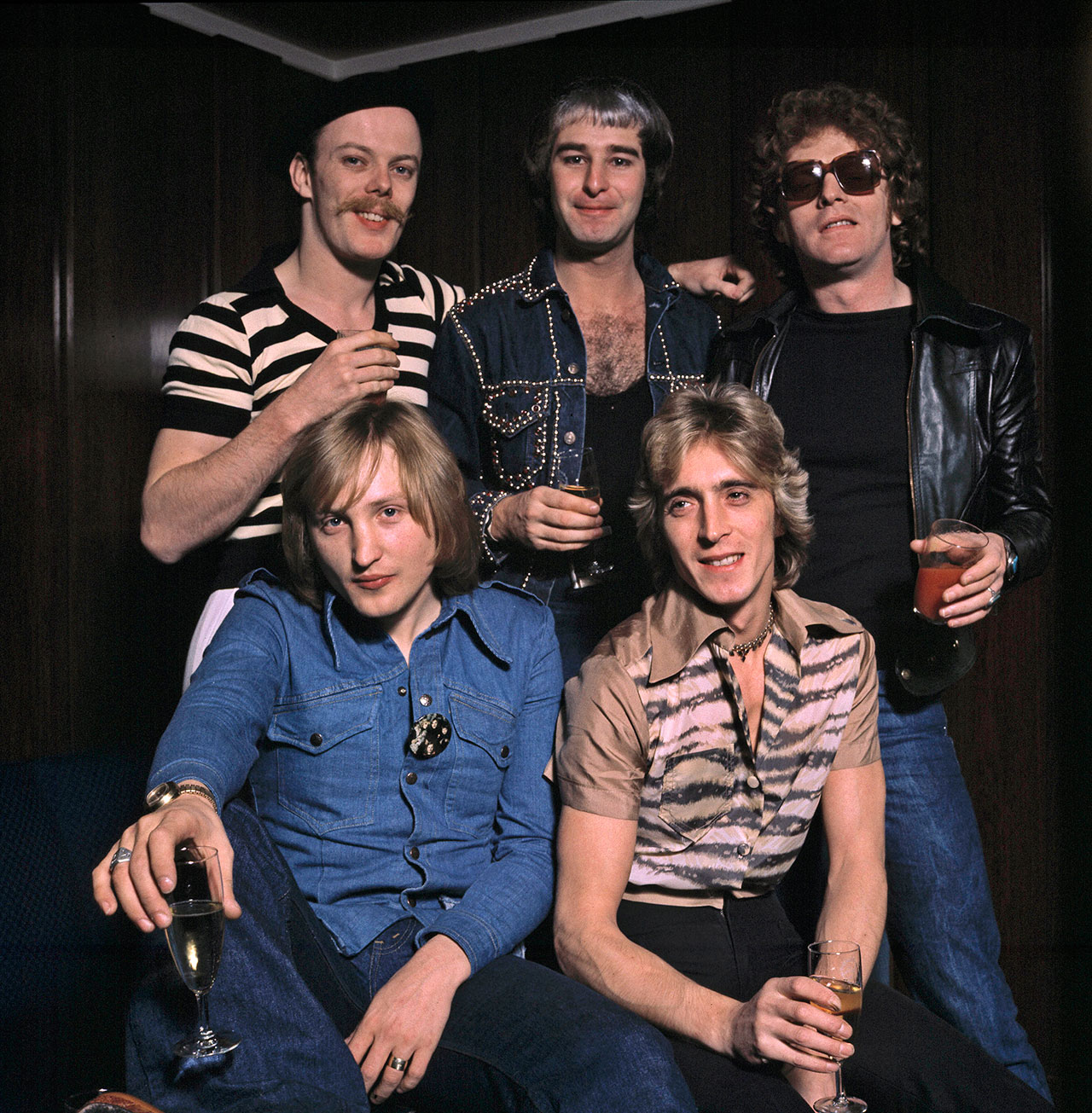
In the late 1980s, Ronson’s health began to cause concern. He was diagnosed with liver cancer, something he neither made a secret of nor chose to acknowledge as a threat. Instead he threw himself into projects such as Morrissey’s Your Arsenal and Bowie’s Black Tie White Noise. He also kicked off a fine version of All The Young Dudes with Bowie and Hunter at the Freddie Mercury Tribute Concert at Wembley Stadium on Easter Monday, 1992, which was the last time his fans saw him on stage.
Sometimes he confided his fears to Dana Gillespie. “I volunteered at Marsden Hospital and talked to Mick a lot about cancer,” she says. “I told him it isn’t necessarily the end of the road, though with liver cancer it generally is. He tried various holistic therapies, and I gave him juiced carrots and vegetables that could be easily absorbed. He was getting extremely thin.”
Hunter remembers: “He wasn’t well when he did I Feel Free on the Bowie record [Black Tie White Noise], and really he shouldn’t have done it.”
He was in remission during the Morrissey recordings. Speaking to Classic Rock now, Morrissey has the fondest memories. “Everyone who worked with Mick expresses devotional love for him, whereas people who worked with Bowie express admiration. Mick told me that he alone wrote the main guitar hooks for Starman, The Man Who Sold The World and others – not just hooks, really, but grand choruses in themselves – but a share of publishing wasn’t ever on offer for him. When you consider his solos in Time and Moonage Daydream, then you can guess that they were his own creations.
“What is remarkable is that he was so overlooked, and he still is! Has Mick ever been on the cover of a major British music magazine? Even when he died? He was by nature extremely humble. He was just happy to be there. But one moment is quite telling, for me, in relation to his position with Bowie. There’s a late clip on YouTube of Mick and Bowie discussing my song I Know It’s Gonna Happen Someday. The song ends very similarly to Bowie’s Rock ’n’ Roll Suicide. This part was added on to my song by Mick, who said: ‘Don’t worry, Bowie can’t sue – because I wrote it in the first place.’”
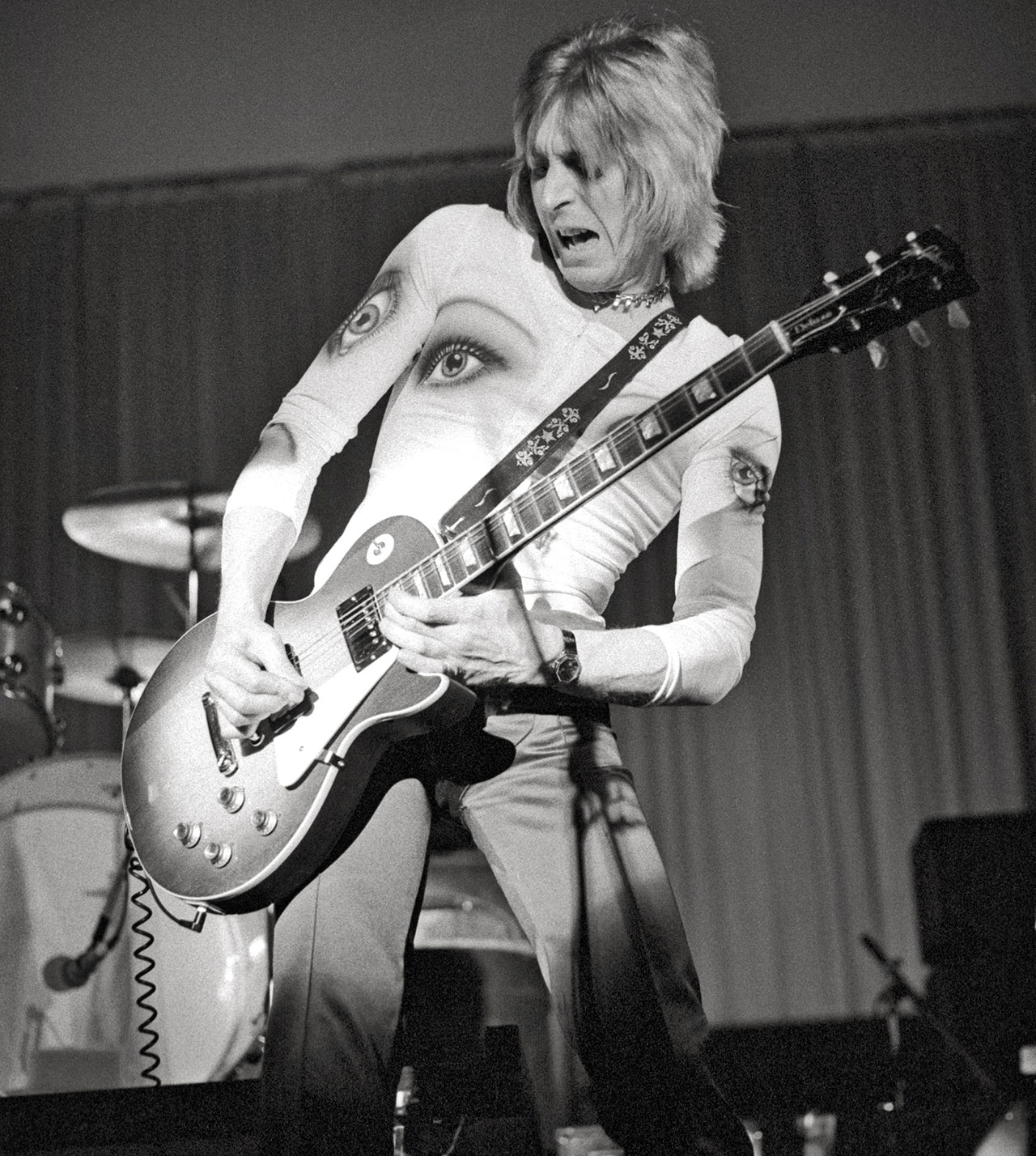
However, in the YouTube clip, Ronson tells Bowie that the coda was already on the song before he started working on it. To Morrissey, “the clip shows Mick to be not exactly afraid of Bowie, but overwhelmed by him. And it possibly sums up the reason why Mick couldn’t make any demands of Bowie, as if to fall out with Bowie meant he might miss his legacy. I had met Bowie many, many times, and the obvious conclusion to me was that he was an unashamedly ruthless person. Mick did not have that ruthlessness, which is why he is buried in Hull.”
A fan of both, Morrissey was intrigued by letters sent by Bowie to his old guitarist chum. “Mick had active correspondence from Bowie during the recording of Your Arsenal – meaning soldier-like letters with postage stamps on them. One day at breakfast I asked Mick why Bowie wrote so often, and he said: ‘He keeps asking me what you’re like in the studio,’ and then he exploded with laughter. I have no idea why this was so hilarious. I think Bowie had interest in Mick only as much as it was in his nature to like anyone.”
Ronson played guitar on Your Arsenal but didn’t want a credit. “Again this was Mick’s unaffected Cinderella aspect, which I later saw in Jeff Beck when I worked with him on my Years Of Refusal album,” Morrissey recalls. “Jeff and Mick were identical in the way that they would quietly pick up their guitars without fanfare, and as they sat in the corner they’d plug into the desk and a tingling earthquake would erupt without any discourse. And they both made their guitars sound like grand pianos.”
On Ronson’s posthumously released Heaven And Hull, he wrenched out some of his finest ever work, particularly on Dylan’s Like A Rolling Stone, with Bowie’s astounding vocal inspiring the guitarist to take the song to another planet. And he still had enough time to play on The Wildhearts’ My Baby Is A Headfuck, recorded weeks before his death on April 29, 1993. He spent his last hours in the company of Hunter, Suzi and sister Maggi at Tony Defries’s house on Hasker Street in West London.
Ronson didn’t die penniless, but he wasn’t wealthy by rock star standards. “He bought the house in Woodstock on Glasco Turnpike [in New York State] because he made money out of my records and Ellen Foley’s Night Out,” says Ian Hunter. “His car was an old Toyota Corolla that sounded like a hairdryer.”
Hunter summed up the gloomy finale in his Ronno elegy Michael Picasso: ‘You turned into a ghost surrounded by your pain/And the thing that I liked the least was sitting round Hasker Street, lying about the future.’
As for Benny Marshall, one of the old stalwarts from Hull, his memories are more sweet than bitter. “I still see his mother and she still lives in their old council house. It’s very odd going there now, because the house hasn’t been modernised or updated. It’s exactly the same as when I used to go in the sixties. It’s very weird being in the kitchen where Mick and I sat, him with his guitar at the same old table, and we’d play albums together and practise The Rats songs. Sometimes it feels like he never left. Like he is still there. I wish he was.”
Beside Bowie – The Mick Ronson Story has its UK cinema premiere on May 8, and will be broadcast as part of the Sky Arts Rocks season on Sky Arts on May 27.
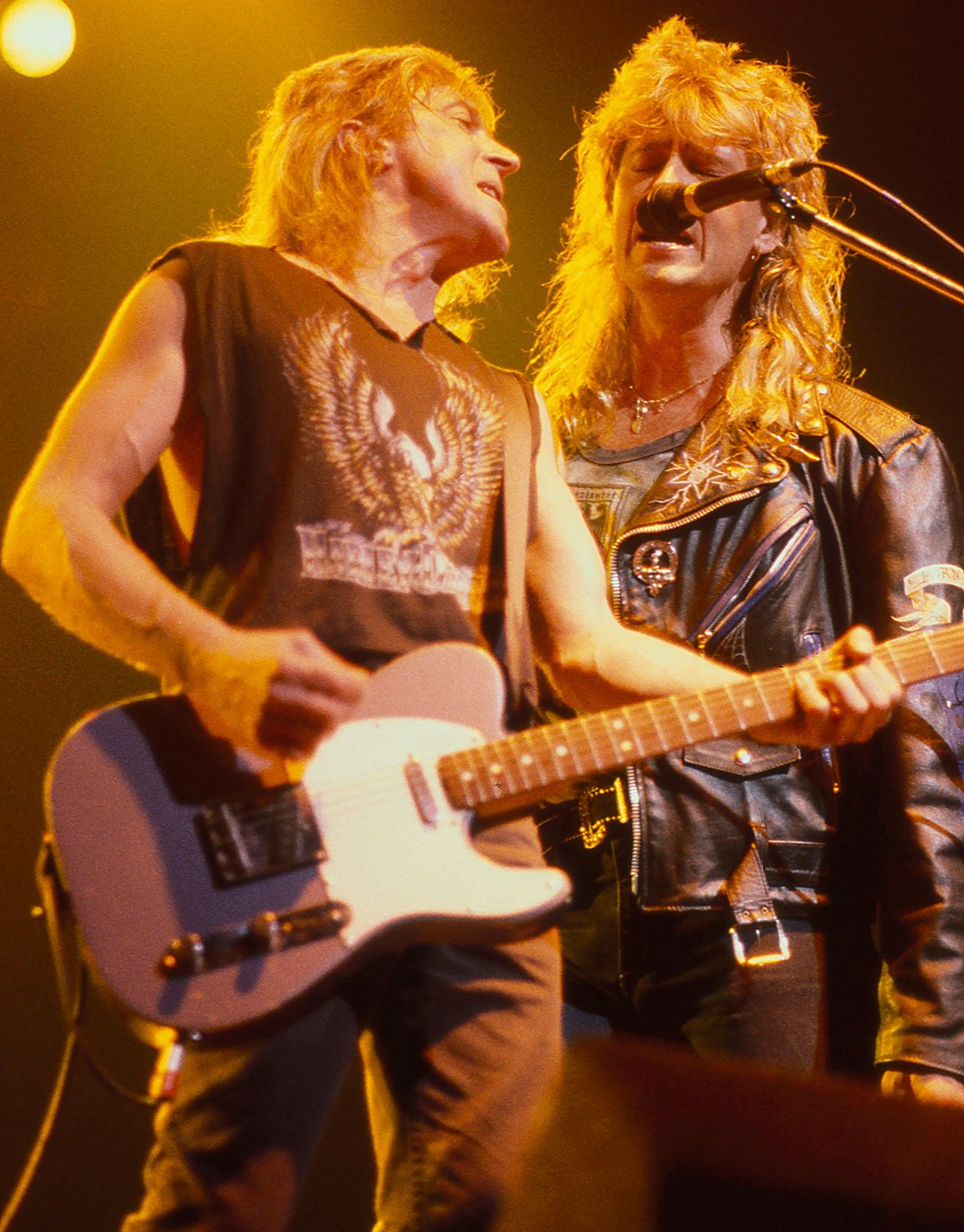
Joe Elliott Remembers Mick Ronson
The Def Leppard frontman on the hero who became a friend.
“I first met him in New York, at The Ritz. He was touring the Schizophrenic album with Hunter. He came out of the dressing room door and tied his shoelace up with his leg on a table. He turned to me and said: ‘Eh oop, lad.’ We went for dinner and talked about nothing to do with music – it was more reminiscing about Yorkshire puddings and Yorkshiremen abroad: you can’t get this, you can’t get that.
“When he was doing Heaven And Hull he came to my studio in Dublin ten days before he died. We were recording the vocals for Don’t Look Down and Take A Long Line and he told me how he wanted it to sound. Only later did I twig he was giving me instruction because he wasn’t going to finish it himself.
“My wife made him Sunday roast and he was in his element. He drank a lot of tea and ate Hobnobs. He was taking a lot of morphine, and that gave him such a kick, he had instant energy every time he topped up his meds.
“I saw him once at The Greyhound in Fulham playing with Lisa Dalbello [Ronson produced her 1984 album Whomanfoursays]. It was my twenty-fifth birthday, so we went out for dinner and got bollocksed. He blew the candles out on my birthday cake! I’ve still got a photo of that night in me bloody wallet.
“In Dublin I made some cassettes of his old BBC sessions with Bowie for him. Suzi said: ‘Oh, he never listens to that old stuff.’ But he did. I suppose he wanted to hear his life’s work one more time.”
Mick Ronson's Greatest Moments
Mick Ronson: Hull's Guitar God
Buy/pre-order the soundtrack to Beside Bowie – The Mick Ronson Story from Amazon
